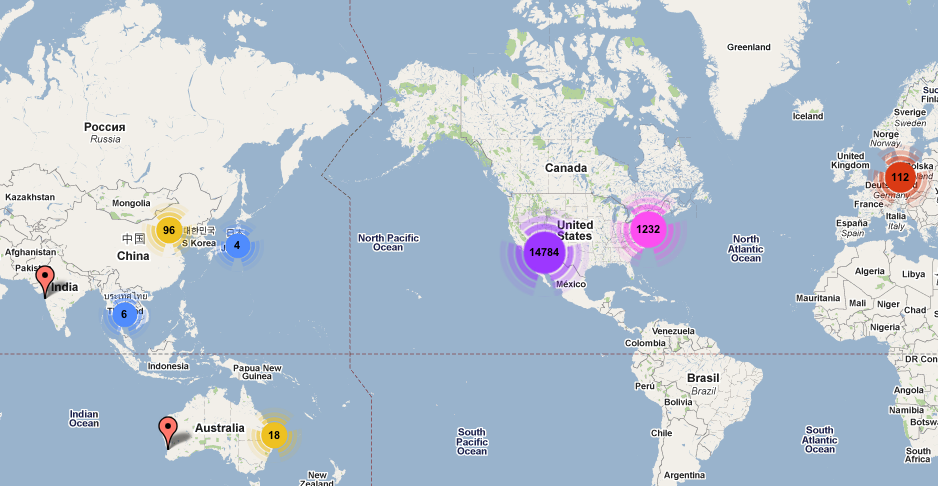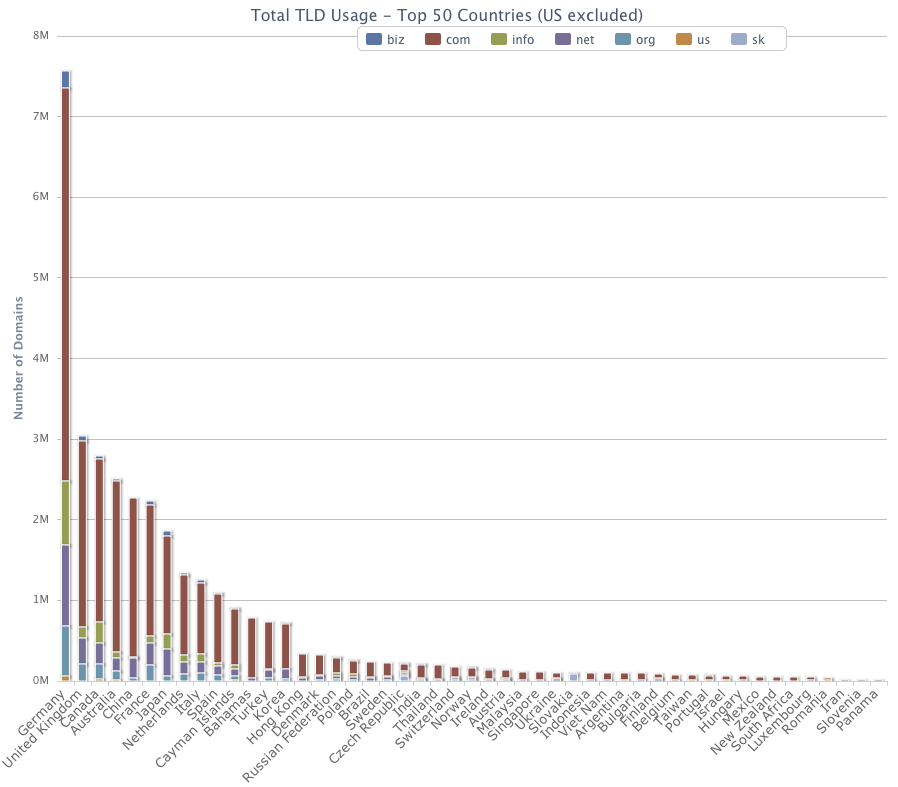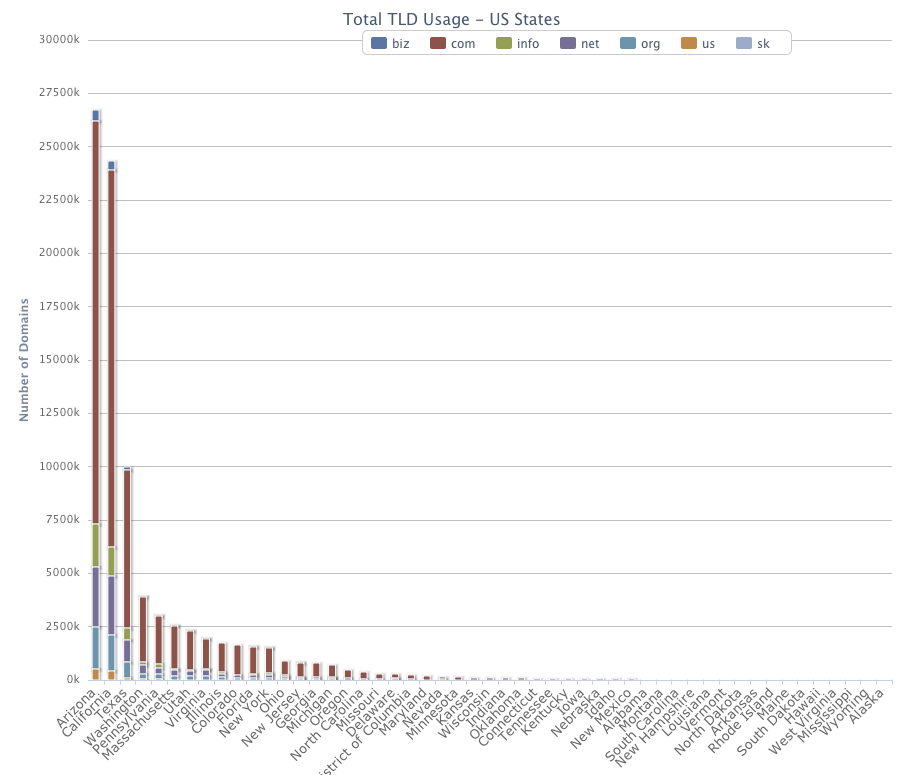|
Quicksearch
Calendar
|
Tuesday, January 18. 2011PHP Excel Extension 0.9.1
The 0.9.1 version of the Excel extension was released and is now available for download. This is mostly a bug fix release, with a number of contributions by Rob Gagnon. The 2 main fixes are related to detection of custom formatted numeric fields, that were incorrectly detected as dates and readRow()/readCol() methods that had a bug when 2 and 3rd parameters are supplied, causing the last row/column not to be read. Additionally a getSheetByName() method was introduced that allows locating a sheet by it's name in either case sensitive or insensitive form.
GitHub: http://github.com/iliaal/php_excel/ Source: http://github.com/downloads/iliaal/php_excel/php-excel-0.9.1.tar.bz2 Wednesday, December 22. 2010
ISP Popularity by Domain Count Posted by Ilia Alshanetsky
in PHP, Stuff at
17:06
Comments (2) Trackback (1) ISP Popularity by Domain Count
The past two information gathering runs showed that GoDaddy is the world largest ISP, but I was curious who else falls into the “Top ISP” category as determined by consumer shopping habits. To do this I’ve used my resolved IP database of 124 million domains and an ISP database from MaxMind.
The results are pretty interesting, and it clearly shows that a small number of ISPs are definitely doing something right, which is causing many consumers to vote with their dollars in those ISPs favor. As usual the information is shown in graph form, to filter down the data to just the large providers I’ve set a minimum at 100,000 domains, leaving me with just 122 ISPs. The image below shows the break-down of the Top 25. If you click on it, you will be able expand the chart to 50,100 or the entire list in a form of a bar chart, or explore the pie chart that includes %s.  Since we already know GoDaddy is #1, I will skip them over them and focus on the next largest 3. At #2, we have The Planet, a Texas based data-center provider with 6.1 million domains (4.91% of total). It should mention that The Planet had recently merged with Softlayer Technologies, #8 on our list, which would further expand their prominence by another 1.8 million domains. At #3 we have 1&1 Internet, a German ISP with 5 million domains (4.04%). And finally at #4 we have Internap, an Atlanta based ISP with 2.88 million domains (2.32%). In total, the 25 largest ISPs represent 52.3% of all the domains, which quite impressive since overall there are 31,173 distinct ISPs. Even within the top 25 things are not entirely even, only the first 15 can claim over 1 million domains. Expanding the ISP list to Top-50, expands the domain coverage to 59.67%, not a whole lot. However once the entire list of ISPs with >100k domains is considered we are looking at 68.9% representation. This means that 2/3 of the entire internet is effectively managed by only 122 companies. Kinda scary, actually. In an effort to validate the popularity of the ISPs, I’ve also decided to look at the IP address breakdown (how many IPs per domain) and which ISPs the Top-IPs belong to. This should identify the ISPs whose business is predominantly the result of parked domains. The results for Top 25 IP addresses are shown in the table below  When it comes to IP addresses, GoDaddy is by far the most frugal, which probably relates to the fact that they do a lot of domain parking. Both #1 and #2 on the list belong to GoDaddy, representing 12.9 million and 6 million domains respectively. I should mention that #4 with 1.9 million domains and #6 with another 1.1 million domains also belong to GoDaddy. Based on this information it would seem that GoDaddy’s prominence in the ISP space is predominantly based on parked domains, which take up 22 million of the 26.4 million being hosted with them. This can probably be attributed to GoDaddy’s extremely aggressive pricing when it comes to buying domains. The 3rd most popular IP address belong to Oversee.net, with just over 2 million IPs. Given that Oversee.net only has 2.57 million domain under management, it would seem that most of them are parked domains, same situation as with GoDaddy. Couple of other big IPs worth noting are 64.95.64.197, which belongs to Internap, with 1.31 million domains resolving to it. Given that Internap hosts 2.88 million domains, it seems just shy of 1/2 of their domain base is parked. Another “winner” is 216.21.239.197 which belongs to Register.com with 669k domains, which represents nearly the entirety of of the 703k domains at that ISP. Unsurprisingly Network Solutions is in the same boat, of the 1.32 million domains under management, 1.15 are parked on 3 IP addresses. On a general note, the 124 million domains are hosted on just 5.39 million IP addresses, which raises interesting questions about IPv4 exhaustion, clearly domain hosting is not the reason. So what the heck are people using those public IPs for? If they are being used by Internet Providers to provide internet to consumers, one would think that more extensive use of NAT would certainly alleviate the IPv4 shortage for quite some time. There are some 81,164 IPs that have over 100 domains resolve to them, if combined, their total domain count reached 87.4 million, 70% of all registered domains. Since It is safe to assume that in most cases virtual hosting won’t have more then 200 sites per IP, than based on the gathered data, 81.4 million domains are parked on 37,865 IPs. This in turn means that 2/3 (65.4%) of all domains are not actually in-use. A number very similar to the % of domains hosted the world’s Top ISPs, so perhaps the things are not so bad after-all and the non-parked domains are more evenly distributed than the initial numbers might suggest. Tuesday, December 21. 2010
Domain Distribution by City Posted by Ilia Alshanetsky
in PHP, Stuff at
13:04
Comments (4) Trackback (1) Domain Distribution by City
As part of my on-going domain informatics coverage, I am now publishing some additional information that I’ve been able to gather in the last few days.
I am making available two additional geographic chats that breakdown the domain distribution by top world cities. The first chart a preview of which can been below (click to see full, browse-able/zoomable version) shows the Top 150 cities, by domain distribution. These cities represent a total 91.3% of some 102 million domains that could be resolved to a city level.  The most popular city in the world, with 26.4 million domains calling it home is Scottsdale, Arizona in United States. Which is not entirely surprising, given that it is the hometown on GoDaddy, world’s largest domain provider/hosting company. This coincidentally means that Arizona, which had won the US state domain count contest with 26.7 million domains in our previous round of statistics, is entirely due to GoDaddy. The 2nd largest city is San Francisco, with a respectable 14.3 million domains, which represents over 1/2 of the 24.3 million domains hosted in California. And the 3rd place goes to Houston, Texas with just shy of 6.1 million domains. Overall there are only 15 cities in the world that can claim to host over a 1 million domains and all of them are found in the US. The first non-US city is actually Toronto, Canada at #19 with 850 thousand domains, shortly followed by Beijing China with 845 thousand domains. The smallest city on the Top 150 list is Oklahoma (Capital of Oklahoma, US) with just 43.4 thousand domains. Seems tiny compared to the beginning of the list, but on global country scale it would actually make it into Top 50 at 49, with almost twice as many domains as Iran (23.4 thousand domains) that would now be displaced to 50th place. To give a slightly better domain concentration view, I am publishing a dynamic cluster map that groups cities together by geographic proximities. Zooming in on the map will breakdown the larger clusters into smaller eventually, eventually resolving all the way to the individual cities. Due to better visualization of markers on this map, I’ve expanded the city list to the Top 400 cities. Which takes us down to as little as 8,600 domains and provides a slightly more worldly view. Click on the map below to see the dynamic version. 
Sunday, December 19. 2010
Domain Location Statistics Posted by Ilia Alshanetsky
in PHP, Stuff at
21:51
Comments (9) Trackback (1) Domain Location Statistics
I recently re-started the process or aggregating PHP usage data and first sample of small dataset (about 10 million domains) has been the subject of my PHP Advent article. Now, I've started the process of collecting the data on the full data set which comprises of 124 million domains that represent the entirety of .com, .net, .biz, .info, .us, .sk and .org TLDs.
The first step of the process has been resolving all of these domains, which is now complete. The next step is fetching the server information, which began, but will take some time to finish. However, even from the domain revolving data there is a lot of useful data to be gleamed, which is what I am now publishing. My first focus was on the world-wide distribution on these TLDs, which at least for me held a few surprises. First of all, unsurprisingly US has the most domains hosted on its soil, however its sheer overwhelming of other countries is quite impressive, and stands at just over 89 million domains, 71% of all domains!. In 2nd place is Germany (which was actually a surprise, my guess that it would be Canada or Japan) with 7.5 million domains and the bronze goes to United Kingdom with 3 million domains. Canada was actually 4th with 2.7 million domains and Japan all the way in 9th place with 1.86 million domains. Below is a graph representing the top 50 Countries according to the domain distribution. To see more detail, click on the image which will bring up a zoomable HighChart graph.  Note that the US excluded, due to the high number of domains it made the graph not usable and unfortunately HighCharts library does not supposer logarithmic scale. What I did instead is a create a separate chart, which breaks down the domain distribution by US states, which can be found further in the article. As you can tell from the World chart, the domain distribution is highly un-even, the top entry starts with Germany at 7.5 million and by the time hit Spain at #12, we are down to 1 million domains. By the time we get to Bulgaria that is in 37th place were are down to just 100k domains. By the time last entry in our chart appears, which happens to be Panama, we are down to a mere 21,709 domains. As with the world data, US domain distribution also had a surprise in store for me. I would've guessed that the majority of domains would find their home in California, being itself the home of Silicon Valley. However, California actually came in second, behind Arizona of all states. Arizona is home to 26.7 million domains, while California can only lay claim to 24,.3 million, Texas came in 3rd with a mere 9.99 million domains. Below is the chart showing all the states, click on the image which will bring up a zoomable HighChart graph.  As with the world stats, the US domain distribution is also extremely uneven, only 12 states can lay claim to being home to over a million domains. The 12th being state, being New York with 1.56 million domains. By the the time we reach Indiana at #27, we are down to just 100k domains. Alaska trails the list at a mere 4729 domains, which seems tiny, however it still more more then 130 countries, which on a world scale would place at at #71, ahead of Iceland an Saudi Arabia, that both have just over 4100 domains. I've also created a clickable world-map that will let you explore all 222 countries, US and Canada are clickable and will give you breakdown of the individual states/provinces. While the sever information script is gathering data, which should take about 2 weeks I am hoping to generate more data based on the IPs, which should give ISP popularity, avg. # of domains per single IP with info on the "top IPs" and other curious bits of info I can gleam from free/public MaxMind I am using. P.S. If you have access to TLDs other then the ones I listed, I would be grateful if you would be willing to provide domain lists for those TLDs on a one-time or monthly basis. Thursday, November 18. 2010PHP Excel Extension 0.9
The 0.9 version of the Excel extension was released and is now available for download. This version was updated with support for LibXL 3.1.0, and introduces a number of new methods that can be used to manage repeating of printable rows, creation of named rages, and summary positioning.
GitHub: http://github.com/iliaal/php_excel/ Source: http://github.com/downloads/iliaal/php_excel/php-excel-0.9.0.tar.bz2 Wednesday, November 10. 2010
Forum PHP: APC & Memcached Slides Posted by Ilia Alshanetsky
in PHP, Talks at
15:41
Comments (0) Trackbacks (0) Forum PHP: APC & Memcached Slides
The slides from my talk at Forum PHP on the topic of "APC & Memcached" are now up and can be downloaded here: Barcelona_APC_MEM2010.pdf
Thanks to the all the listeners, who hopefully were able to keep up with a the slightly rushed timing of the presentation and I am really sorry that there was not much time for questions, if you have any, please catch me during the conference, I'll be happy to answer them. As always feedback (good or bad) is much appreciated via Joind.In at: http://joind.in/2107 Thursday, November 4. 2010
Hidden Features of PHP Slides Posted by Ilia Alshanetsky
in PHP, Talks at
00:07
Comment (1) Trackbacks (0) Hidden Features of PHP Slides
My slides for the "Hidden Features of PHP" talk that I've given at ZenCon 2010 are now available at:
zendcon_2010_hidden_features.pdf Thanks to everyone for listening, and I look forward to feedback at: http://joind.in/talk/view/2270 Wednesday, November 3. 2010
Memcached, the Better Memcache ... Posted by Ilia Alshanetsky
in PHP, Talks at
15:53
Comments (5) Trackbacks (0) Memcached, the Better Memcache Interface Slides
A litte tardy, but better late then never. The slides from my talk on Memcached extension are now up and can be downloaded from here:
ZendCon_Memcached_2010.pdf Thanks to all the people who attended the talk and I really am looking for your feedback via Join.in Saturday, October 30. 2010
APC & Memcache the High ... Posted by Ilia Alshanetsky
in PHP, Talks at
10:17
Comments (4) Trackbacks (0) APC & Memcache the High Performance Duo Slides
The slides for my talk on "APC & Memcache the High Performance Duo" are now available here: Barcelona_APC_MEM2010.pdf. Thanks to all the attendees for listening and asking questions, hopefully there are a few converts to APC/Memcached resulting from this talk
Friday, October 29. 2010
Hidden Features of PHP Slides Posted by Ilia Alshanetsky
in PHP, Talks at
09:41
Comment (1) Trackbacks (0) Hidden Features of PHP Slides
Just finished my talk on the "Hidden Features of PHP" at the PHP Barcelona conference. First time me giving this particular talk, which I think (hope) went pretty well. Big thanks to all the attendees for being there, especially those to braved the large crowd and asked questions.
The slides from the talk are now available online and can be downloaded at: barcelona_2010_hidden_features.pdf Friday, October 22. 2010Conference Schedule
In a few days I will attempt one of my most tricky conference schedules in a long while (perhaps ever), I get the feeling a vacation will be in order after all this.
It was a privilege to get my talks accepted accepted at the PHP Barcelona Conference 2010 in Barcelona, Spain where I will be speaking about Hidden Features of PHP as well as APC & Memcached. Then I get to fly home to Toronto for about 24 hours, and from there travel to ZendCon in Santa Clara, California, where I get to speak about the (awesome) Memcached extension and some more Hidden Features of PHP. Then I fly back to Toronto, for roughly 36 hours, after which I depart to Paris, France to speak at the Forum PHP organized by AFUP to talk about APC & Memcached. Should be fun Monday, August 30. 2010
Beware of the default Apache 2 ... Posted by Ilia Alshanetsky
in PHP at
18:52
Comments (14) Trackbacks (0) Beware of the default Apache 2 config for PHP
About a week ago, I was doing some upgrades on my development machine and came across a rather nasty issue when it comes to how .php(s) files are associated with PHP in Apache. It seems that a number of distros including Gentoo (which is what I was using) are using the following configuration directive to make the PHP module parse PHP files:
The non-obvious problem with the above is that it will allow not only "file.php" to be treated as PHP scripts, but also "file.php.txt", which means that any file containing ".php" in its name, no matter where in the filename, would be treated as a PHP script. This of course creates a rather nasty security hole, since many upload file validation tools, only check the final extension. Consequently allowing the user to by-pass the validation, by simply prefixing another "harmless" extension like .txt, .pdf, etc... to the filename, but still get the code to execute. To mitigate this problem you should instead use the following configuration, that would only pick-up of files ending with a .php extension. The difference between the two configurations being that the original uses AddHandler (bad) and the latter uses AddType (good). Friday, August 27. 2010PHP Excel Extension 0.8.6
PHP Excel Extension 0.8.6
The 0.8.6 version of the Excel extension was released and is now available for download. This version was updated to contain LibXL 3.0 support which introduces Excel 2007/2010 read/write support, which means that this extension can now read and generate any Excel file. Support for XSLX (2007/2010) format can be enabled by passing "true" as the 3rd parameter to the ExcelBook() construtor. GitHub: http://github.com/iliaal/php_excel/ Source: http://github.com/downloads/iliaal/php_excel/php-excel-0.8.6.tar.bz2 Wednesday, August 11. 2010PHP Excel Extension 0.8.5
The 0.8.5 version of the Excel extension was released and is now available for download, it contains a number of small build fixes, which makes it possible to compile it against all versions of PHP (5.2,5.3,trunk). The Win32 compilation was also fixed and thanks to Kalle, PHP 5.3 win32 binaries are now available for download as well.
GitHub: http://github.com/iliaal/php_excel/ Source: http://github.com/downloads/iliaal/php_excel/php-excel-0.8.5.tar.bz2 Win32 Binaries: http://github.com/downloads/iliaal/php_excel/php-excel-5.3.zip Sunday, August 1. 2010PHP Excel Extension
Since I broke my right hand 3 weeks ago while biking, I found myself with a lot of spare time :/. It is amazing just how limited your ability to do things becomes when you can only use one hand. So, to stave off the boredom, I've been slowly toiling away on a PHP Excel extension that I intend to use at work, which I've finally gotten ready for release today.
You can find it on github at: http://github.com/iliaal/php_excel. Continue reading "PHP Excel Extension" |
Categories


|
|||||||||||||||||||||||||||||||||||||||||||||||||





